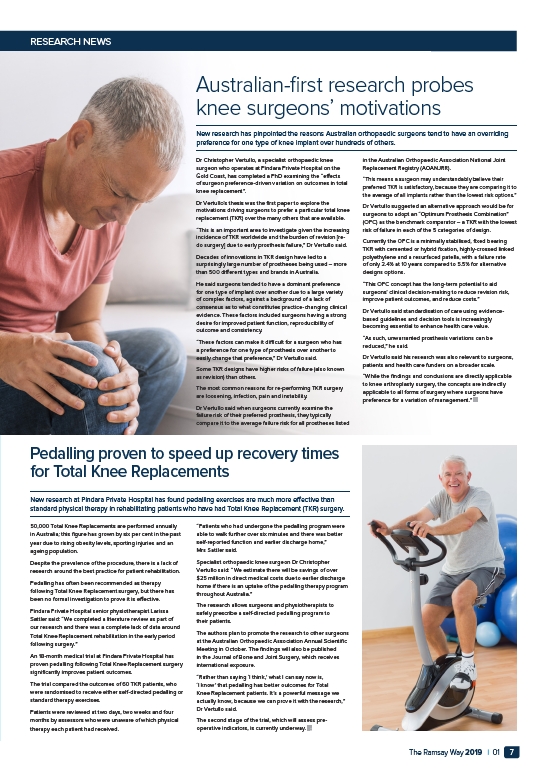
The Ramsay Way 2019 | 01 7
RESEARCH NEWS
Australian-first research probes
knee surgeons’ motivations
New research has pinpointed the reasons Australian orthopaedic surgeons tend to have an overriding
preference for one type of knee implant over hundreds of others.
Dr Christopher Vertullo, a specialist orthopaedic knee
surgeon who operates at Pindara Private Hospital on the
Gold Coast, has completed a PhD examining the “effects
of surgeon preference-driven variation on outcomes in total
knee replacement”.
Dr Vertullo’s thesis was the first paper to explore the
motivations driving surgeons to prefer a particular total knee
replacement (TKR) over the many others that are available.
“This is an important area to investigate given the increasing
incidence of TKR worldwide and the burden of revision re-do
surgery due to early prosthesis failure,” Dr Vertullo said.
Decades of innovations in TKR design have led to a
surprisingly large number of prostheses being used – more
than 500 different types and brands in Australia.
He said surgeons tended to have a dominant preference
for one type of implant over another due to a large variety
of complex factors, against a background of a lack of
consensus as to what constitutes practice-changing clinical
evidence. These factors included surgeons having a strong
desire for improved patient function, reproducibility of
outcome and consistency.
“These factors can make it difficult for a surgeon who has
a preference for one type of prosthesis over another to
easily change that preference,” Dr Vertullo said.
Some TKR designs have higher risks of failure (also known
as revision) than others.
The most common reasons for re-performing TKR surgery
are loosening, infection, pain and instability.
Dr Vertullo said when surgeons currently examine the
failure risk of their preferred prosthesis, they typically
compare it to the average failure risk for all prostheses listed
in the Australian Orthopaedic Association National Joint
Replacement Registry (AOANJRR).
“This means a surgeon may understandably believe their
preferred TKR is satisfactory, because they are comparing it to
the average of all implants rather than the lowest risk options.”
Dr Vertullo suggested an alternative approach would be for
surgeons to adopt an “Optimum Prosthesis Combination”
(OPC) as the benchmark comparator – a TKR with the lowest
risk of failure in each of the 5 categories of design.
Currently the OPC is a minimally stabilised, fixed bearing
TKR with cemented or hybrid fixation, highly-crossed linked
polyethylene and a resurfaced patella, with a failure rate
of only 2.4% at 10 years compared to 5.5% for alternative
designs options.
“This OPC concept has the long-term potential to aid
surgeons’ clinical decision-making to reduce revision risk,
improve patient outcomes, and reduce costs.”
Dr Vertullo said standardisation of care using evidence-based
guidelines and decision tools is increasingly
becoming essential to enhance health care value.
“As such, unwarranted prosthesis variations can be
reduced,” he said.
Dr Vertullo said his research was also relevant to surgeons,
patients and health care funders on a broader scale.
“While the findings and conclusions are directly applicable
to knee arthroplasty surgery, the concepts are indirectly
applicable to all forms of surgery where surgeons have
preference for a variation of management.”
Pedalling proven to speed up recovery times
for Total Knee Replacements
New research at Pindara Private Hospital has found pedalling exercises are much more effective than
standard physical therapy in rehabilitating patients who have had Total Knee Replacement (TKR) surgery.
50,000 Total Knee Replacements are performed annually
in Australia; this figure has grown by six per cent in the past
year due to rising obesity levels, sporting injuries and an
ageing population.
Despite the prevalence of the procedure, there is a lack of
research around the best practice for patient rehabilitation.
Pedalling has often been recommended as therapy
following Total Knee Replacement surgery, but there has
been no formal investigation to prove it is effective.
Pindara Private Hospital senior physiotherapist Larissa
Sattler said: “We completed a literature review as part of
our research and there was a complete lack of data around
Total Knee Replacement rehabilitation in the early period
following surgery.”
An 18-month medical trial at Pindara Private Hospital has
proven pedalling following Total Knee Replacement surgery
significantly improves patient outcomes.
The trial compared the outcomes of 60 TKR patients, who
were randomised to receive either self-directed pedalling or
standard therapy exercises.
Patients were reviewed at two days, two weeks and four
months by assessors who were unaware of which physical
therapy each patient had received.
“Patients who had undergone the pedalling program were
able to walk further over six minutes and there was better
self-reported function and earlier discharge home,”
Mrs Sattler said.
Specialist orthopaedic knee surgeon Dr Christopher
Vertullo said: “We estimate there will be savings of over
$25 million in direct medical costs due to earlier discharge
home if there is an uptake of the pedalling therapy program
throughout Australia.”
The research allows surgeons and physiotherapists to
safely prescribe a self-directed pedalling program to
their patients.
The authors plan to promote the research to other surgeons
at the Australian Orthopaedic Association Annual Scientific
Meeting in October. The findings will also be published
in the Journal of Bone and Joint Surgery, which receives
international exposure.
“Rather than saying ‘I think,’ what I can say now is,
‘I know’ that pedalling has better outcomes for Total
Knee Replacement patients. It’s a powerful message we
actually know, because we can prove it with the research,”
Dr Vertullo said.
The second stage of the trial, which will assess pre-operative
indicators, is currently underway.